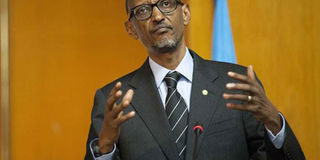Genocide tribunal winds up but freed convicts remain stateless

Rwanda President Paul Kagame talking during a press conference at the National Palace in Addis Ababa on April 16, 2015. A tribunal formed to try Rwanda genocide suspects is winding up this month in Arusha; but some of those freed may end up stateless. PHOTO | ZACHARIAS ABUBEKER | AFP
What you need to know:
- However, a former judge said the tribunal’s success may be diluted by failure to find homes for those acquitted.
- It is thought to have played a vital role in shaping the future of international justice, especially after its bench interpreted the meaning of genocide to include rape.
- Rwanda’s Justice Minister Johnston Busingye denied claims that the released men and women would be in danger if they went back home.
ARUSHA, SATURDAY
A tribunal formed to try Rwanda genocide suspects is winding up this month in Arusha; but some of those freed may end up stateless.
There were praises last week during a ceremony to mark the end of the International Criminal Tribunal for Rwanda (ICTR).
However, a former judge said the tribunal’s success may be diluted by failure to find homes for those acquitted.
“The continued failure of the global community to find host countries for acquitted persons and those freed undermines the concept of international rule of law,” Sir Dennis CM Byron, former president of the Tribunal said.
ICTR was the world’s first UN tribunal set up to deal with international crimes.
It is thought to have played a vital role in shaping the future of international justice, especially after its bench interpreted the meaning of genocide to include rape.
It also established precedence for no immunity on crimes against humanity and genocide.
“The ICTR will not just serve as a permanent reminder of the Rwandan genocide. It has significantly contributed to the development of international law and to the fight against impunity,” ICTR President Vagn Joensen said when the tribunal unveiled a memorial park in Arusha.
Formed by the UN Security Council in 1994, it made history by being the first such non-permanent court to try and a head of government.
Former Rwandan Prime Minister Jean Kambanda received a life sentence.
In its 20 years of existence, it indicted 93 people mostly senior government officials, military chiefs, businesspeople and journalists thought to have had a hand in the killings of more than 800,000 Tutsis and moderate Hutus.
Sixty-one of them were convicted of genocide and 14 acquitted on appeal.
SAFETY CONCERNS
Nine suspects are still at large and are supposed to be handled either by Rwanda or the after-ICTR programme called Mechanism for International Criminal Tribunal, in Arusha.
“ICTR jurisprudence in reaching these decisions has put it on the map when no one was giving us much credit. We all have a responsibility, which is that we cannot tolerate impunity,” Ms Navanethem Pillay, the first female judge to sit on the ICTR bench told the Sunday Nation.
The South African, who later became the UN High Commissioner for Human Rights, said ICTR set precedence for Africa to pursue justice through reconciliation and courts.
“The tribunal, and now the International Criminal Court, came in to compliment national jurisdictions, and everyone is given a fair trial. If there is no evidence, we just say “out!” People are encouraged to reconcile and forgive but we must also see culprits punished,” she added.
Although ICTR called for cooperation of UN member states, it is silent on whether that cooperation includes resettling the freed.
Fourteen suspects were acquitted.
However, they refused to go back to Rwanda.
“They have expressed concern for their safety if they return to Rwanda,” ICTR Registrar Bongani Majola said.
Once released, these people were hosted by the UN in “safe houses” in Tanzania.
Rwanda’s Justice Minister Johnston Busingye denied claims that the released men and women would be in danger if they went back home.
“Very many people have been in Rwandan courts and are now free,” Mr Busingye told journalists.
“They are not an issue to us. If they are a burden of the UN, Rwanda is not going to share that burden but they should feel free as Rwandans who have gone through a justice system.”
NO INTERVIEWS
Despite the assurance, Rwanda has requested that none of the convicts be interviewed by journalists.
Six of those acquitted got placements. Former Mabanza Mayor Ignace Bagilishema and his Rukara counterpart Jean Mpambara were resettled in France after negotiations.
Mr Emmanuel Bagambiki, a former government representative in Cyangugu and former army general Augustin Ndindiliyimana were taken to Belgium.
Former Education minister Andre Rwamakuba settled in Switzerland while Hormisdas Nsengimana, a priest, now lives in Italy.
ICTR is still unable to resettle former Transport Minister Andre Ntagerura, former army general Gratien Kabiligi, businessman Protais Zigiranyirazo, former Health minister Casimir Bizimungu, former foreign affairs chief Jerome Bicamumpaka, ex-commerce minister Justin Mugenzi, former commander of reconnaissance battalion Francois Xavier Nzuwonemeye and Mr Prosper Mugiraneza a former official in the ministry of civil service.





